(Ji Deqiang, Ge Yanling, Li Zhe, Liang Kairui) On May 28, 2021,“Building A Community with Shared Future for Mankind - China Think-Tank Forum 2021”organized by the Institute for a Community with Shared Future (ICSF) was held at Communication University of China (CUC). President of CUC Liao Xiangzhong attended the opening ceremony and delivered speech, while Vice President Duan Peng presided over the opening ceremony and the appointment ceremony of directors of the International Academic Network for a Community with Shared Future (IAN-CSF). Guests from central ministries and commissions, experts from more than 30 universities and think tanks gathered together to communicate for promoting theoretical research and international communication for the idea of “building a community with shared future for mankind”.
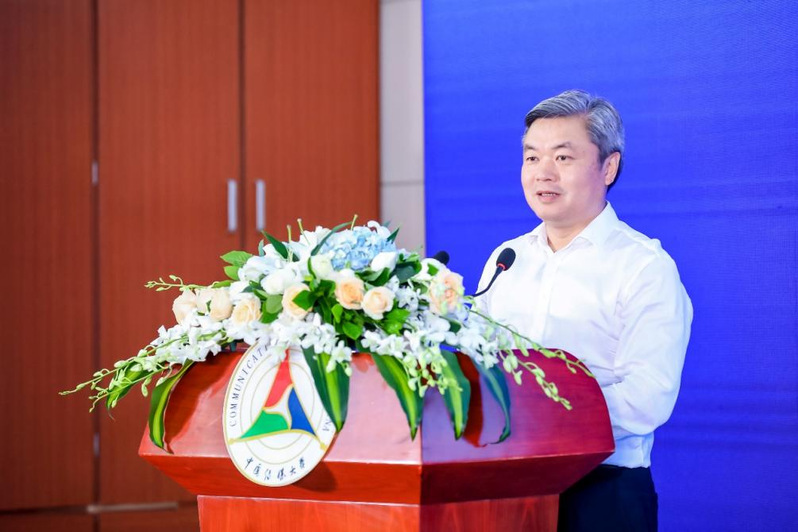
CUC President Liao Xiangzhong attended the opening ceremony and delivered speech
On behalf of the CUC, President Liao Xiangzhong expressed his sincere thanks to all the guests and introduced the background and initial intention of the establishment of the ICSF, CUC. He pointed out that the concept of Community with Shared Future is both a guiding spirit for Chinese diplomacy and a new ideafor global governance. The two major goals of ICSF are the theoretical research of the globalization processes towards a community with shared future and the global communication of this idea. Chinese President Xi Jinping once said that we are not alone on the great way and the whole world is one family. Through a year of pandemic, we have realized the significance of building a community with shared future more deeply than ever. At the same time, the pandemic has accelerated the promotion of our researches as it made people feel the profundity of this concept.
Liao further mentioned that after the COVID-19 pandemic, the pace of mutual learning among global civilizations will be greatly accelerated. Promoting the research and dissemination around the community with shared future will also be our core work. We are setting up an open,collective and service platform, and through the establishment of this platform, we would like tobring together leading experts and scholars in related research areas all over the world to promote the sustainable development and prosperity of human society.

CUC Vice President Duan Peng presided over the opening ceremony
CUC Vice President Duan Peng remarked that “Building A Community with Shared Future for Mankind - China Think Tank Forum 2021”is a landmark event for the research of this concept. Experts and scholars from Chinese famous think tanks and universities came to CUC to join in the research and communication of this concept, which will effectively promote the interdisciplinary research of this concept and create a better research environment on the community with shared future.

Address by Huang Yihua, Deputy Director of Research Office of International Department Central Committeeof CPC
Huang Yihua, the deputy director of the Research Office of International Department, Central Committeeof CPC, pointed out that in recent years, China has continued to achieve break throughs on communication and cultural dialogue. At present, we has established cooperation with more than 600 political parties in more than 160 countries globally. In the process of interaction, we introduce our experience and philosophy of governance in the spirit of equal exchange and mutual learning according to the needs of each country. China would like country all over the world to share the experience of China's economic development, ideas and concepts to achieve common development. This is an important way for promoting the understanding of the idea of community with shared future.
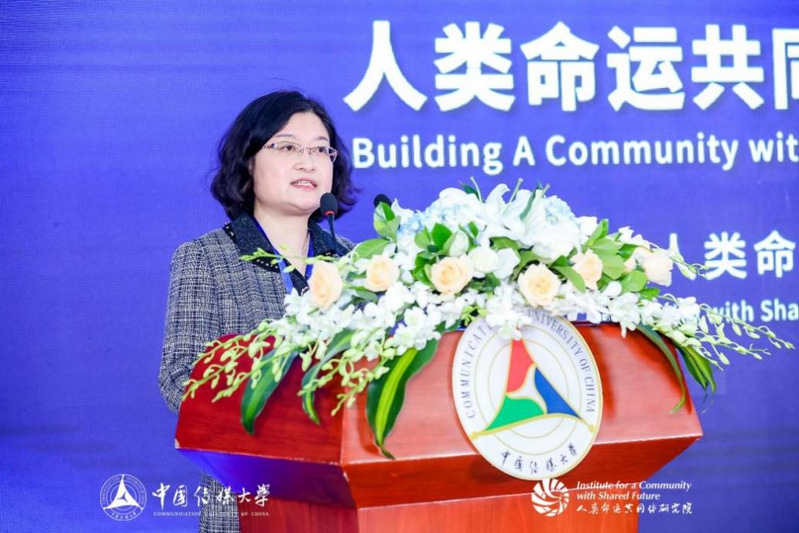
Address by Zhai Yaliu, Second Inspector of Foreign Cooperation and Communication office, Central Compilation & Translation Bureauand Executive Editor-in-Chief of Theory China
On behalf of the Foreign Cooperation and Communication office, Central Compilation & Translation Bureau, Zhai Yaliu, executive editor-in-chief of Theory China, congratulated the forum on its convening. She believes that while the global fight against the COVID-19 pandemic has brought more spaces and opportunities for the dissemination of the concept of a community with shared future, the development of the pandemic has also accelerated the adjustment of the international landscape. Many complications have emerged in global governance and economic and social aspects, especially the stigmatization and isolation of China and the Communist Party of China by Western forces led by the United States, which has posed severe challenges to the international dissemination of this concept. The concept of acommunity with shared future is a new idea of solutionfor global challenge, embodying Chinese wisdom, as a fundamental narrative of contemporary Chinese diplomatic discourse system and important theoretical support for telling the story of China.
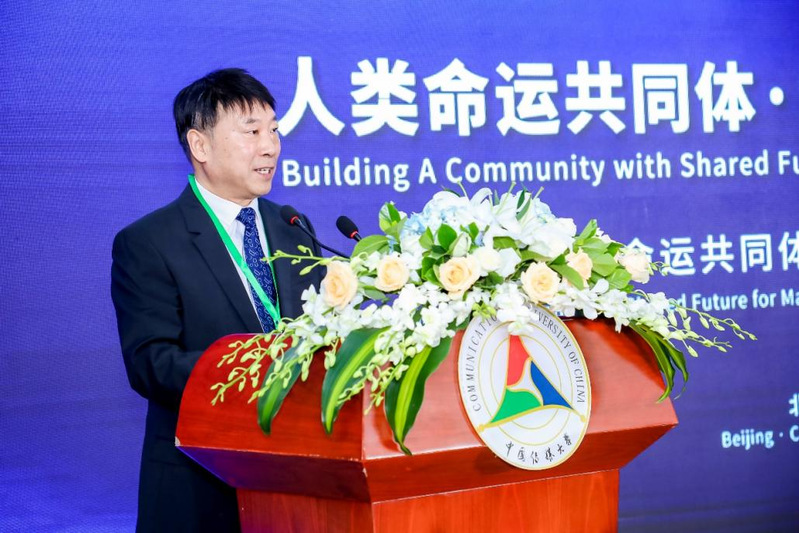
Li Huailiang, Dean of the Institute for a Community with Shared Future, Communication University of China, introduced the construction of the International Academic Network and International Research Centers
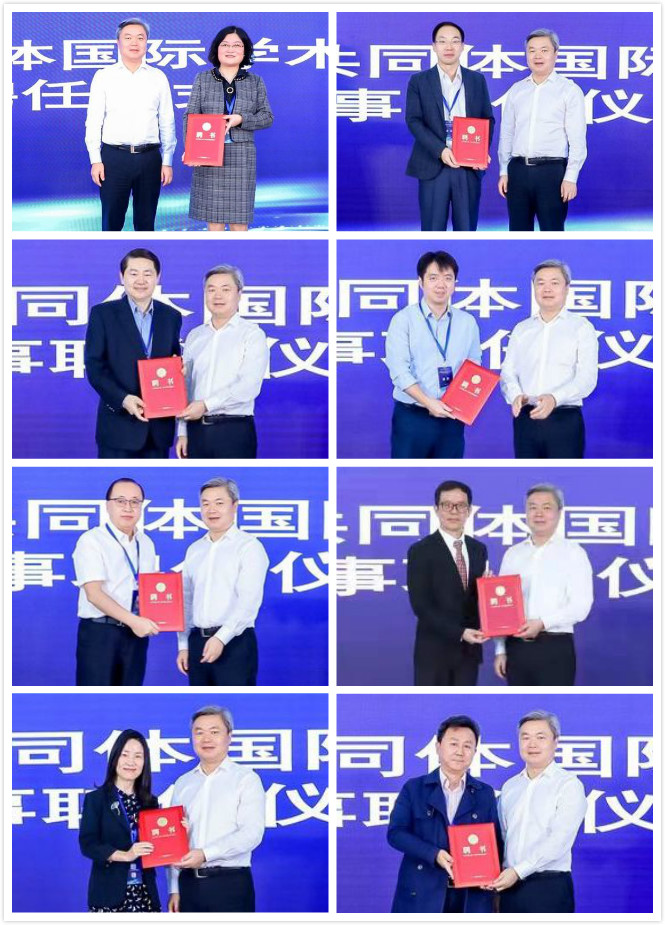
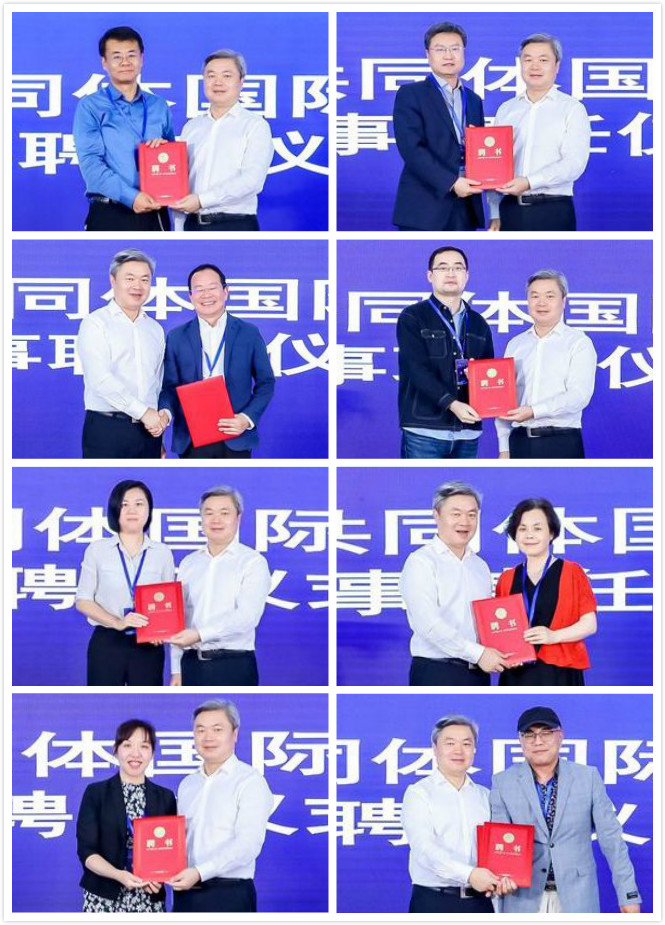
CUC President Liao Xiangzhong presented the letters of appointment to the board members of the International Academic Network for a Community with Shared Future
After the opening ceremony, the appointment ceremony of the board members of the International Academic Network for a Community with Shared Future was held successively. President Liao Xiangzhong issued the letters of appointment to each member.
Then the Dean Li Huailiang introduced the construction of the IAN-CSF and seven International Research Centers. He reiterated that the ICSF has two tasks, one is theoretical research and the other is international communication, and the basic idea is to deepen theoretical research on the concept of a community with shared future and expand the international influence of the concept through international cooperation, and promote the construction of a diversified world discourse system. Based on this idea, we have built seven International Research Centers located in Ethiopia, Tanzania, Malaysia, Seoul, and Incheon of Korea, Germany, and Pakistan, and with this in mind, we have initiated the establishment of the IAN-CSF in cooperation with KCL in the UK.
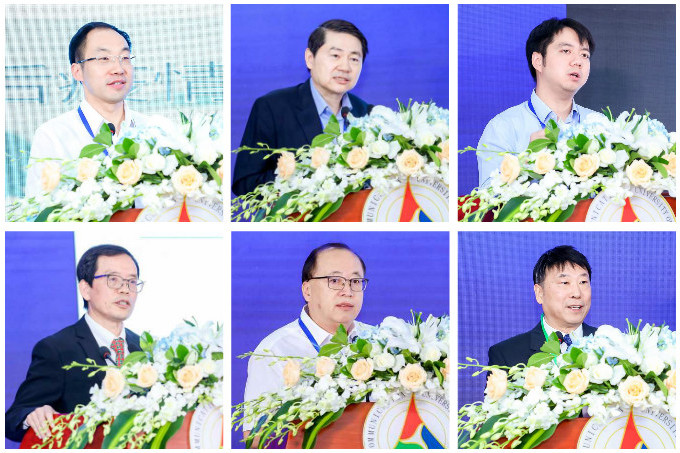
Themed Round Table Session
The round table on “Theoretical Perspectives and Chinese Wisdom on a Community with Shared Future” was hosted by Professor Li Huailiang.
Firstly, Yu Yunquan, Dean of Academy of Contemporary China and World Studies, China Foreign Languages Publishing Administration, suggested that acommunity with shared future is a primary and conceptual idea proposed by China, especially for dealing with the challenges in global governance. The research and dissemination of the concept and related theories can be expanded from combining major issues to reflect the accessibility of the goals, establishing an academic network for international research, stressing the role of the media, and youth groups.
Then Professor Wang Wen, Executive Dean of Chongyang Institute for Finance Studies, Renmin University of China, gave an innovative interpretation of the impact of infectious diseases on the changing process of great powers. He suggested that the logic of infectious diseases on the changing process of great powers is rapid destruction, long-term disruption and promotion of change. All the humankind is a community with shared future, the rise and fall of great powers is not equal to the rise and fall of countries, but the common defense against viruses attack.
Next, Wang Huiyao, Chairman of CCG and counselor of the State Council, pointed out that we are now entering a new era of intricacy and complexity, which requires new strategies and new positioning, building a community with shared future is accepted by the world. Still, the challenges are how to enrich this concept, especially how to establish a set of narratives that can be understood internationally and started from the periphery and the Belt and Road.
Professor Liu Hongwu, Dean of the Institute of African Studies, Zhejiang Normal University, pointed out that a truly global common and shared knowledge system based on the traditional knowledge and modern wisdom of various countries and nations, formed through equal dialogue and pluralistic exchanges will contribute to the construction of a community with shared future, which must be a practical process of two-way construction and must be built on a specific concept of space and timeas well.
Research fellow Li Shaoxian, Dean of School of Arabic Studies, Ningxia University focused on the issue of how to promote the construction of a community in the Middle East region, and believed that the governance, peace and development of Middle East countries require a whole intervention of the international community. China's Belt and Road initiative and the concept of a community with shared future for mankind are timely and should be vigorously promoted to build a new order in the Middle East.
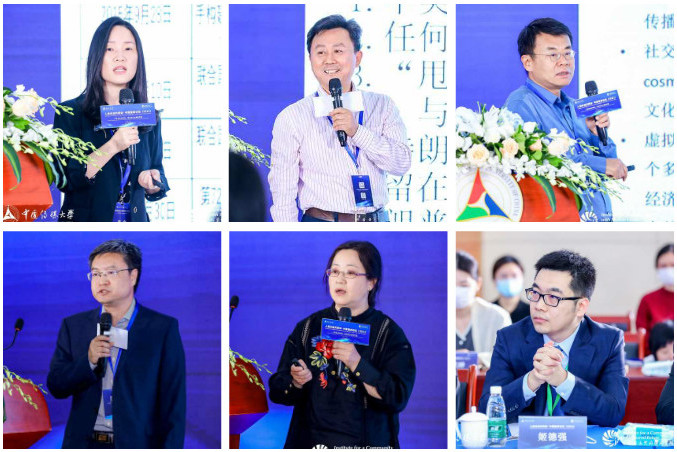
Themed Session I
Themed Session I, “Conceptual Norms and Communication Paths of a Community with Shared Future”, was hosted by the Vice Deanof ICSF, Ji Deqiang.
Professor Xu Xiuli, Dean of CIDGA, China Agricultural University, stated that telling the Chinese story requires focusing on the experience of hard technologies and soft governance, which is based on the analysis of the plurality of the world and the multi-subjectivity of actions.
Professor Jiang Fei, Dean of School of International Journalism & Communication, BFSU, reviewed the history of international communication and analyzed the motivation of the downward trend of international communication, taking why Trump uses Twitter as the starting point, and argued that Trump has opened Pandora's Box and sunk the antipathy against China.The way we respond is telling the story of China well and properly.
Professor Shi Anbin, Vice Dean of School of Journalism and Communication, Tsinghua University, distinguished the concepts of international communication, intercultural communication and transcultural communication. He believed that in the new era, we should focus on the ICON model, in terms of expanding the concept of foreign communication, we should focus on the opinion market and emotional market atboth COL and KOL levels.
Professor Zhang Haibin, Vice Dean of School of International Studies, Peking University, focused on how China can practice the notion of acommunity with shared future in theglobal climate governance. He pointed out that international organizations, with the UN as the core, are the most important platforms for promoting this idea. To achieve this goal, it is necessary to vigorously train talents in international organizations and global governance, strengthen theoretical research on the idea, and actively send experts in various fields to participate in the writing of reports of international organizations.
Professor Zhang Yanqiu, Vice Deanof ICSF, pointed out that the idea of acommunity with shared future contains a profound sense of concern, problem consciousness and collaboration. At the same time, constructive journalism has a strong orientation of problem consciousness and human concern consciousness of acommunity with shared future.
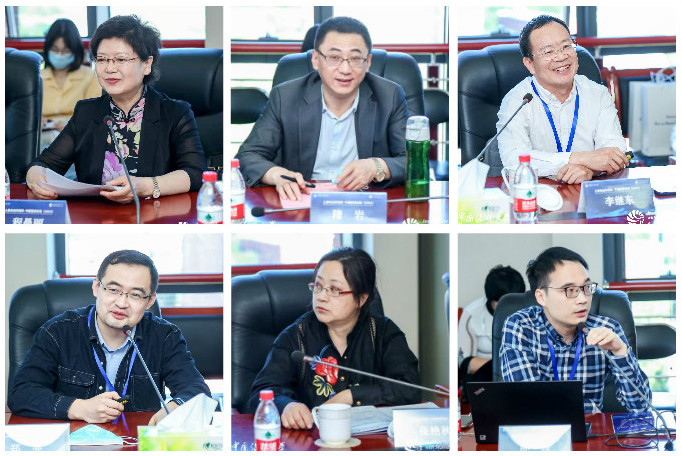
Themed Session II
Themed Session II, “International Context and Public Opinion Response of a Community with Shared Future”, was hosted by the Vice Dean of ICSF, Zhang Yanqiu.
Professor Cheng Manli, Director of the National Institute of Strategic Communication, Peking University,pointed out that the two major patterns of the world are intertwined, the interests of the United States and its Western allies are aligned, and the long-term influence of the United States on global public opinion concerning China has shaped the perception of the image of China by Western countries. She suggested, it is necessary to take discourse advantage to ensure the ability to express our opinionsunderthe new world context, and change passivity into initiative.
Professor Sui Yan, Dean of School of Journalism of CUC, analyzed the phenomenon of Netflix discourse and public opinion in China's Internet communication due to the participation of multiple subjects in the creation of text superimpositions, revealing the intertextuality in the production and dissemination of public opinion. He argued that the complexity of current public opinion stems from the diversity of communication subjects. Through vivid case studies, he summarized and reflected on the variability, contextualization, and potential risks of over-interpretation of group communication in setting public opinion and Internet narratives.
Professor Li Jidong, Vice Dean of Communication Research Institute of CUC, pointed out that the historical transformation of China's international communication discourse system has formed an inter-constructive relationship with national identity, and that the discourses common equal and pluralism show the core value of human orientation advocated by China, which should become the main theme and key meaning of China's international communication discourse system.
Professor Zheng Liang, Vice Dean of School of Journalism and Communication, Jinan University, analyzed the role of universityand think tanks in the international public opinion/discourse competition with examples. He believes that international communication is based on domestic governance and domestic consensus, while field research should be given high priority.
Professor Chen Qiang from Xi 'an Jiaotong University, presented that practice of Xinhua News Agency and other Chinese mainstream media on international social media platforms, pointing out that leader's event news and video news can help improve the overall international communication strength of China's media social accounts, and suggested that the user-oriented thinking, optimized content strategy, adherence to objectivity and flexible use of communication language should be used to improve the international communication of Chinese mainstream media in the social media era.
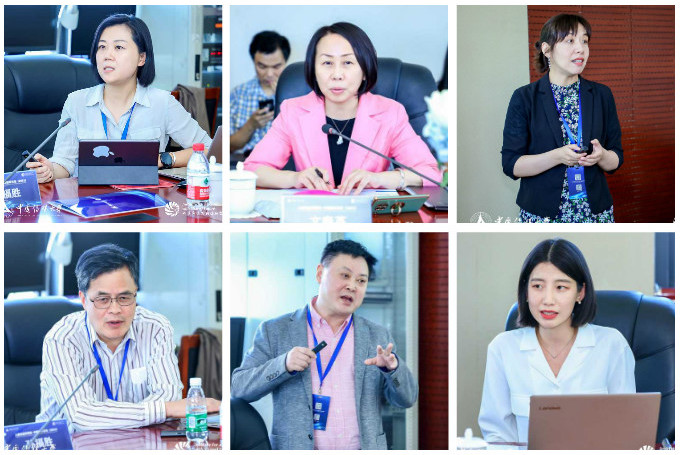
Themed Session III
Themed Session III, “Frontier Issues and Communication Opportunities of Community with Shared Future”, was hosted by Dean of the School of International Studies of CUC, Vice Dean of the ICSF, Wen Chunying.
Professor Hong Yu, Vice Dean of College of Media and International Culture, Zhejiang University, argued that the Internet is a social form with both conceptual and material orientations. We need to overcome the tendency of post-materialism, she said, to attach importance of soft power along with material power, political cognition and discourse structure, and to overcome the past practice of separating the study of China's domestic policy from that of foreign communication, and to emphasize the interaction between the state and its subjects.
Professor Xiao Jun, Deputy Director of Center for Studies of Media Development, Wuhan University, analyzed the practical dilemmas of new media intercultural communication in terms of cultural alienation, virtual community conflict and resistant identity, and proposed the importance of mutual approach and purpose between China and the world, which lies not only in acquiring objective knowledge, but also more importantly in exploring the formation process of multidimensional subjects such as individuals, politics, cultures, regions and nations.
Professor Jiang Shixue from Shanghai University stated the effectiveness of the study of a community with shared future should be examined from the perspective of awareness and international visibility, while avoiding conceptualization and connotation overloaded.
Professor Niu Weigan from Beijing University of Civil Engineering and Architecture suggested that the New Cold War has been put into practice and has shown the three approaches of searching for objects, flexible containment, hard containment and the three characteristics of the new cold war are the changesof time and space, the asymmetry of subjects and practices, and the emergence of digital cold war.
According to Li Siming, a senior researcher at Tencent, one of the communication advantages of COL or cultural experts, is that they are good at spreading their views on social networks. Statistics reveal that netizens have become a new source of information to understand China, and the netizen-based communication model is beneficial to China's foreign communication.
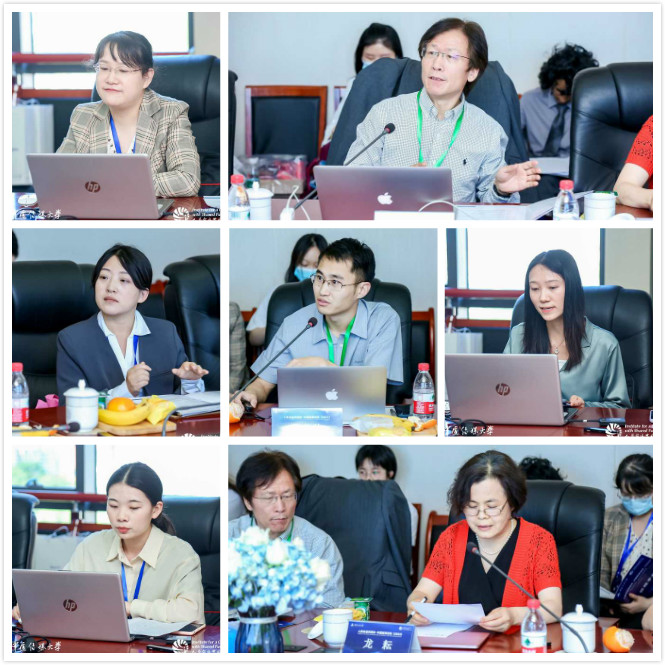
Sub-forum I
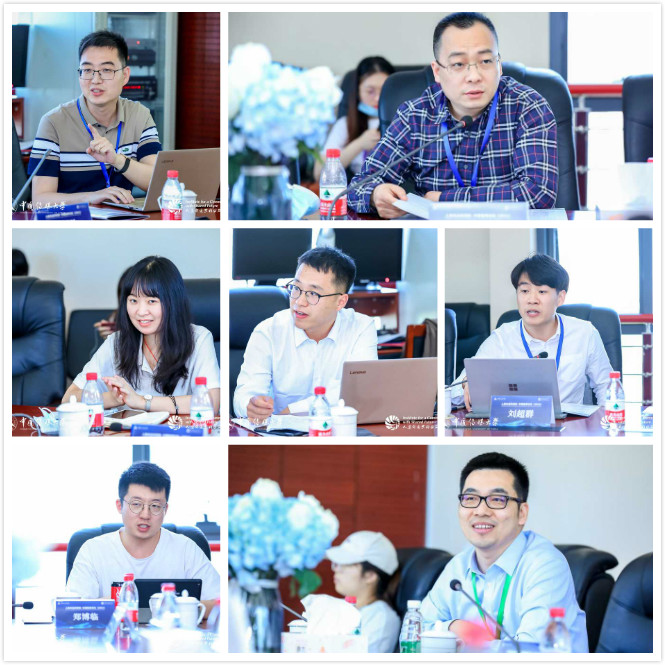
Sub-forum II
Subsequently, two panels themed “International Public Opinion Ecology of a Community with Shared Future” and “New Thinking and New Paths of China's International Communication”, respectively, were held paralleled, which were hosted by Prof. Wang Sixin and Prof. Ji Deqiang , both the Vice Deanof ICSF.
Young scholars and students from Fudan University, Beijing Sports University, Nankai University, Beijing Foreign Studies University, Nanchang University, Inner Mongolia Normal University and Ningbo University shared their research results on the global communication of the concept of a
community withsharedfuture, the communication of Olympic rituals and the current status of research on a community with shared future.
Professor Long Yun, Director of NCCIS, CUC and Associate Professor Huang Dianlinfrom ICS, CUCgavesuggestions for the shared articles and speeches on two panels, providing excellent comments on the paths of theorizing a community with shared future research, the source of problem awareness, and the requirements of high-quality academic research.
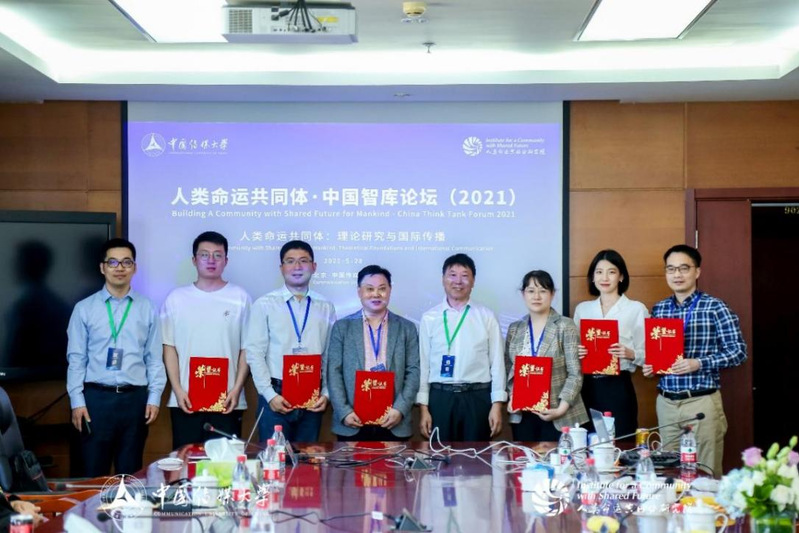
Photo of Authors of Awarded articles
On the closing session of the forum, the organizing committee issued certificates for authors ofsix outstanding articles among nearly 100 submissions and held an award ceremony. Professor Li Huailiang presented the awards and made a concluding speech.
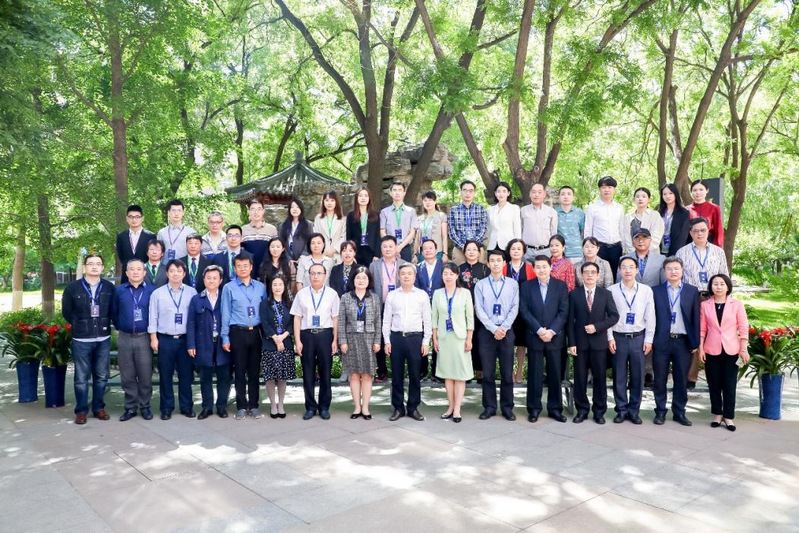
Group photo of ICSF and invited guests
“Building A Community with Shared Future for Mankind - China Think-Tank Forum 2021”initiated by the ICSF of CUC is based on the background of the unbalanced spread of the COVID-19 pandemic globally. It brought together famous experts and scholars in the fields of international relations, international development and international communication to share and discuss the basic theoretical research on a community with shared future for mankind and international communication strategies, creating an interdisciplinary platform for theoretical research on a community with shared future and enhancing the influence of Communication University of China in theoretical research on acommunity with shared future and serving national strategies.
